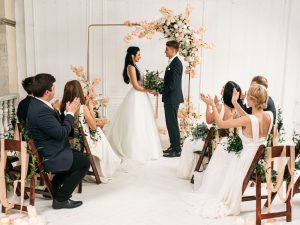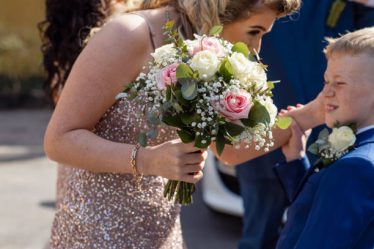
We’re hearing from many couples that their friends and family are nervous about attending their wedding as covid-19’s restrictions on weddings ease and the vaccine rollout continues. Today we want to share some ideas that can help make your guests feel at ease. These covid ideas for weddings are not about guest safety. Our advice is to follow public health advice, work with suppliers, and to minimize risk wherever possible. This feature is about small gestures and logistical details that can give your guests some peace of mind during the planning process and the actual day.
- Although it may seem obvious, it can help to assure your guests that you will not be offended if they do not attend your wedding. While it won’t matter if your guests choose to attend, acknowledging their concerns can help them feel more at ease about attending large events. It’s a good idea to put a line on your wedding invitations, or on your website that says, “While our team will make every effort to ensure the safety of our guests, and we would love for you to attend the wedding, we fully understand if your concerns are not shared with us.”
2. Mention covid-19 in your invitation
Covid-19 is not something that anyone wants to take up too much space on their wedding invitations. For someone anxious about attending a wedding it can be quite alarming to receive an invitation that doesn’t mention the current situation. This might make your guest wonder if you have ever thought about guest safety. A small, but well-written reference to the pandemic is enough. You could say something like “We are so thankful for your love, support and kindness in these difficult times” or “Making our wedding an enjoyable place to celebrate is really important to me – we will make every effort to adhere to covid-19 protocol on that day.” you can also mention it on your website if you don’t want to include it in your invites.
3. Give details to your guests about how the day will play out
We advised couples to avoid going into too much detail during their wedding planning (to avoid unwanted opinions). We have had to modify our thinking on this. It would be unfair to invite people to an event during a pandemic, without giving them basic information. Not when it relates to their personal safety. This doesn’t mean you have to spoil the surprise! These are the main details that impact covid-19 risk. What parts of the day will be indoors? Will outdoor spaces be available to guests all day? How long will the indoor elements last? And will unvaccinated children be present?
4. Give your guests a wedding timeline
It is easy to cover most of the information above by including a timeline of the wedding in your invitations. You can find some useful examples of wedding timelines here. However, we recommend that you add more details about the elements that will be outside, the plan b for rain and the duration of indoor elements to these documents. A clear timeline will allow guests to assess their comfort in attending each section of the day.
5. Allow guests to attend only parts of the day
While you shouldn’t want your guests to miss any part of the day, flexibility is a great tool in pandemic wedding planning. In some cases, it can make all the difference in whether a guest attends or not. If you have an outdoor ceremony, drinks reception and indoor meal planned, you might suggest to your guests that they only be able to attend the outdoor portion of the day. This information doesn’t have to be included on the invitations. You can also communicate this via a follow up message or phone call. Be careful how you phrase it. For example, “We are aware that some guests don’t like indoor socialising yet so we’re happy to have you only attend the ceremony or drinks reception if you prefer.”
6. Create a plan for children and unvaccinated guests
You may not need a vaccine passport to attend your wedding depending on where you live. In ireland, at the time of writing, they are not. Children may not be eligible for vaccines. Couples are faced with the dilemma of whether or not to invite non-vaccinated guests. Although this is a tricky area, it’s much easier to deal with the situation with children than unvaccinated adults. It doesn’t matter what you do, knowing how many unvaccinated guests will attend is helpful information for anxious guests. There are two options for children: a) not inviting them at all (with some exceptions for babies) or b) allowing them to attend the outdoor or daytime celebrations only.
7. Talking to guests about their fears of attending a wedding can be a great way to ease their anxiety. Avoiding a defensive approach won’t help here. Listen to your guests and discuss safety concerns with them. Instead of telling your guest “It will be great!” instead of repeating to your guest, “It’ll be grand!” over and over again, make sure you communicate the safety precautions that will be taken. Take the call as an opportunity for you to raise issues that you have not considered.
8. Many wedding guests don’t feel comfortable spending much time outdoors. It’s likely that your venue already has an area like this, but it is worth talking to the coordinator to find out how it functions and what you can do. For example, could there be more chairs? If it rains, is there cover? Are heaters possible to be used to warm guests? You can see the examples. You can make the area more appealing to guests by using outdoor games. Don’t forget to inform guests about the space and to provide signage that will direct them to it on the day.
9. Get up earlier
There are curfews at many weddings around the world so it’s important to get started earlier than usual. Your guests will be able to spend more time outdoors and won’t feel embarrassed about leaving the venue before the indoor reception if they have planned.
10. Ask your suppliers for advice
Your suppliers will have been involved in many covid-19 weddings at this point. They should also have an excellent understanding of how to make your guests feel comfortable on the big day. To keep guests from congregating at the bar during the meal, your venue may suggest that table service be offered. Your baker might prefer to make individual treats for each guest. These small details can be discussed with guests in advance to give them an idea of the day.
11. It’s a good idea to educate your guests about the requirements for travel quarantine and pcr testing. They can always go to the website or send it by email for this information. Make sure to double-check that all information is correct and check back for any changes as the wedding day approaches.
12. Add safety measures to the day. Make it fun!
It is not necessary to provide your guests with hand sanitizer and masks – the venue should ensure that covid-19 protocol has been followed. But safety-based favors and hand-sanitizing stations are nice ways of showing your guests that you care about their safety. These don’t have to be expensive or complicated. You only need basic supplies and signage. However, you could go the extra mile and provide personalized hand sanitizer and masks for your guests if you want. Signage could be used to remind people to stay away, or to guide guests to different areas.
13. Take into account the colour-coded band system
We have seen colour-coded bands used at events and weddings all over the globe and think they are a fantastic idea! You provide wristbands with the corresponding messages for your guests to choose from. This could be “Hi!” keep your distance! “, “Ok to talk but not touch” and “Ok to give hugs and high-fives!” this can be helpful even if your guests have been vaccinated. After nearly two years of missing events, you may feel a bit anxious. It’ll be an interesting conversation point at the very minimum!


